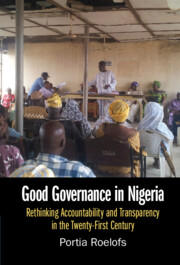Crossref Citations
This Book has been
cited by the following publications. This list is generated based on data provided by Crossref.
Adejumo-Ayibiowu , Oluwakemi Damola
2023.
Understanding good governance: voices of rural people in South-Western Nigeria.
International Journal of Research in Business and Social Science (2147- 4478),
Vol. 12,
Issue. 10,
p.
121.
Roelofs, Portia
2024.
Hidden contestation: valence issues, methodological blindness and the politics of development in Nigeria.
Democratization,
Vol. 31,
Issue. 7,
p.
1513.
Hird‐Younger, Miriam
and
O'Sullivan, Sarah
2024.
Signing documents: Accountability politics and racialized suspicion in Africa's development audits.
PoLAR: Political and Legal Anthropology Review,
Vol. 47,
Issue. 1,
p.
10.
Demarest, Leila
and
Veenendaal, Wouter
2024.
Closer to the people? Determinants of citizen–MP contact in Africa.
Legislative Studies Quarterly,
Sule, Babayo
and
Sambo, Usman
2024.
Presidential Elections in Nigeria's Fourth Republic.
p.
1.
Miller, Jared
2024.
The price of politics: What the 2020 oil shocks in Nigeria teach us about transactional political systems.
Environment and Security,
Vol. 2,
Issue. 3,
p.
431.
Brinkman, Anne-Marie
2025.
Crisis as opportunity—manifestations of civic practice in Libyan governance and rule of law.
Frontiers in Political Science,
Vol. 6,
Issue. ,
LeVan, A. Carl
Baba, Yahaya
and
Musa, Abdu Mukhtar
2025.
Editorial: Trust, participation and pandemic politics in Africa.
Frontiers in Political Science,
Vol. 7,
Issue. ,



